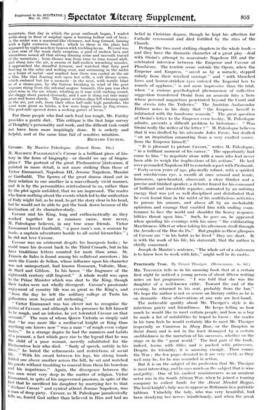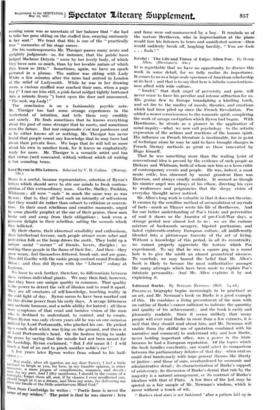Practically True. By Ernest Thesiger. (Heinemann. 8s. (ic1.) Mn. THESIGI?.11
tells us in his amusing book that at a certain first night he noticed a young person of about fifteen writing notes on her programme. " I was told that she was the daughter of a well-known critic. Toward the end of the evening, he returned to his seat, probably from the bar." We hope the author is not so severe on literary critics as he is on dramatic—these observations at any rate are first-hand.
The noticeable quality about Mr. Thesiger's style is its infectious gaiety and friendliness. Ile keeps telling us how much he would like to meet certain people, and how as a boy he made a list of notabilities he hoped to know ; the reader in his turn feels he would certainly like to meet Mr. Thesiger (especially as Cameron in Mary Rose, or the Dauphin in Saint Joan) and is not in the least dismayed by a certain snobbishness in the narration of his successes, whether on the stage or in the " great world." The first part of the book, indeed, teems with titles and is packed with princesses, Despite its triviality, it is amusing enough. Then comes the War ; the few pages devoted to it arc very vivid, as they well may be, for he was wounded in action. But it is on the subject of his profession that Mr. Thesiger is most interesting, and he says much on the subject that is wise and witty. One of his earliest reminiscences as an amateur actor was in the South African War, when he joined a touring company to collect funds for the Absent Minded Beggar. The local knight's lady was to appear as Britannia in a patriotic tableau. Unluckily the lady, who was very beautiful, had been steadying her nerves injudiciously, and when the great
evening came was so uncertain of her balance that " she had to take her pose sitting on the stuffed lion,-swaying ominously in her seat." We trust that this is one of the " practically true " memories of his stage career.
On his contemporaries Mr. Thesiger passes many acute and sprightly judgments—as, for instance, that the public have judged Madame Delysia " more by her lovely body, of which they have seen so much, than by her lovable nature of which they know so little." Sometimes, again, we have an epoch pictured in a phrase. The author was sitting with Lady White a few minutes after the news had arrived in London of the relief of Ladysmith. While he was in her drawing room, a curious muffled roar reached their ears, when a page boy (" Lean see him still, a pink-faced midget tightly buttoned into a minute livery ") burst open the door and announced, "The mob, my Lady!"
The conclusion is on a fashionably psychic note. Mr. Thesiger has had some strange experiences in the borderland of intuition, and tells them very credibly and sanely. -He finds sometimes that he knows everything about the past of some stranger that he meets, and sometimes even the future. But tout comprendre c'est tout pardonner and as he either knows all or nothing, Mr. Thesiger has never found that people resent any knowledge that he may have had about their private lives. We hope that he will tell us more about his own in another book, for it leaves us emphatically ready for more. Mr. Thesiger is a versatile artist and has that virtue (well concealed, withal) without which all writing is but sounding brass.



























































 Previous page
Previous page